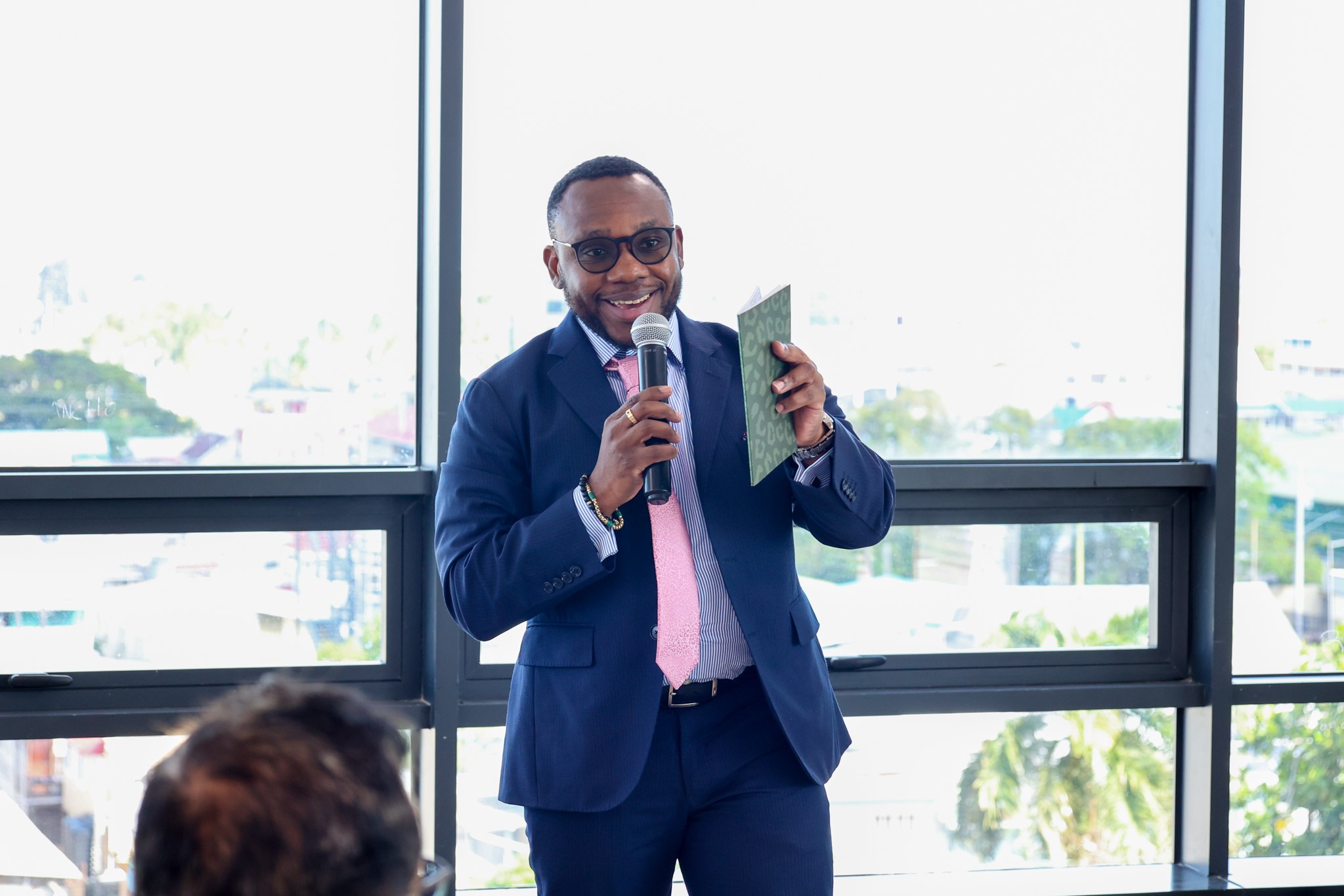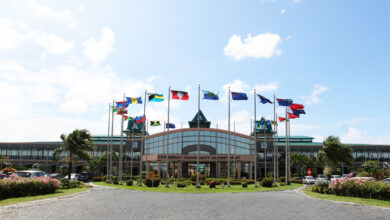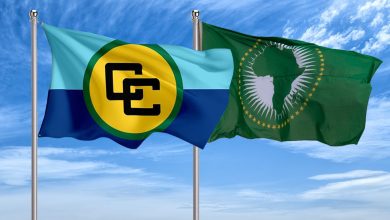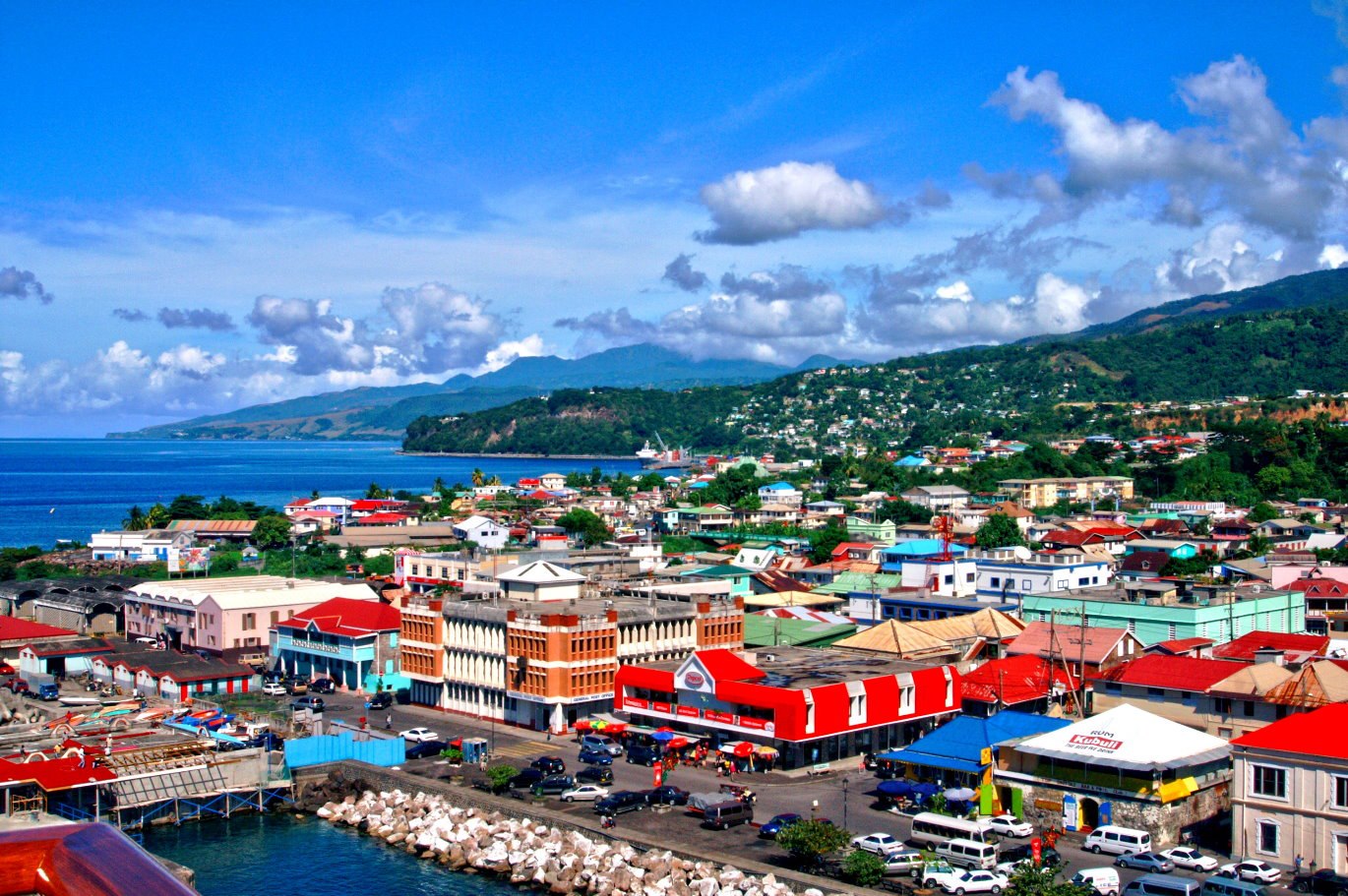CARICOM Secretariat, Turkeyen, Greater Georgetown, Guyana – Director for External Trade, Mr. Joel Richards has recognised Guyana for being the first country in the English-speaking Caribbean to establish a World Trade Center.
Delivering an address on behalf of the CARICOM Secretariat at the recent official opening of the World Trade Center Georgetown (WTCG), Mr. Richards congratulated Guyana for joining a prestigious global network of over 300 World Trade Centers across more than 100 countries.
Hailing this development as a strategic leap forward in the country’s economic transformation and global trade integration, he said,
“You have opened a new door to the world for Guyana and the Caribbean in carving out a competitive, resilient and sustainable space in the global economy.”
Mr. Richards observed that the launch of WTCG comes amid Guyana’s rapid economic rise.
Once classified as a low-middle-income country, he said the country has now attained high-income status, according to the International Monetary Fund (IMF), and recorded the highest real GDP growth rate in the world, averaging 47 percent between 2022 and 2024. This, driven by accelerated oil production, robust non-oil sector expansion, and large-scale infrastructure investments.
“The opportunity is now yours to help Guyana and the wider Caribbean Region be even more of a magnet for investors, bring local innovators and entrepreneurs into global value chains and help to build capacity for a more competitive future,” he stated.
Mr. Richards’ full Keynote Address reads as follows:
Honorable Ministers, distinguished members of the diplomatic corps, esteemed representatives of World Trade Centers, business leaders, members of the media, ladies and gentlemen, a very good afternoon.
First, on behalf of the Secretary General of the Caribbean Community (CARICOM), I congratulate the leadership of the World Trade Center Georgetown (WTCG) on the establishment of a World Trade Center in this fast-growing city. You have now joined the over 300 other World Trade Centers, established in more than 100 countries.
This is a first, not only for Guyana, but also for the English-speaking Caribbean.
By joining the network of World Trade Centers, you can now unlock a wide range of economic, social and strategic benefits as you enable international business, trade facilitation, networking and investment promotion. I am also confident that this Center in Georgetown will contribute to the economic growth and development of Guyana and the wider CARICOM Region.
It is quite apt that the first WTC in the English-speaking Caribbean is opening in Georgetown. Georgetown, and Guyana by extension, has emerged as something of an economic miracle over the past two decades. According to the International Monetary Fund (IMF), Guyana has progressed from low-middle-income to high-income status.
Furthermore, oil production is fast ramping up and, together with strong non-oil growth and large-scale infrastructure investment, it is supporting the highest real gross domestic product (GDP) growth rate in the world at a recorded average of 47 percent in 2022–2024. The outlook for Guyana also remains highly favorable.
The IMF further notes that oil production will continue expanding rapidly, and non-oil real GDP growth is expected to remain strong, largely supported by the government’s efforts to invest in infrastructure, including for climate change adaptation, economic diversification, and improved welfare.
In sum, Guyana’s long-term economic prospects are very favourable with further oil discoveries, productivity-enhancing investment and expanding construction activity set to support and sustain higher GDP growth. The IMF projects average GDP growth for Guyana over the next five years at a rate of 14% per year. With a current account surplus of over 24%, gross international reserves exceeding USD 1 billion and a Natural Resource Fund in excess of USD 3 billion, Guyana finds itself in an envious position.
THE IMPERATIVE OF OUR TIME: A CHANGING GLOBAL BACKDROP
The positive picture painted for Guyana is not one that is universal for the rest of the world. The backdrop to our celebration today and this week is not the seamless globalization of years past, but a more complex, uncertain, and fragmented global environment.
The rules-based international system that underpinned decades of global economic growth is under considerable stress and undergoing structural change. We have a front row seat to trade tensions, geopolitical rivalries, a reassessment of supply chains and a surge in economic nationalism and protectionist policies. These have had the net effect of creating global fragmentation and uncertainty for businesses.
In the context of the World Trade Organisation, a global body which provides the rules and a forum for global trade, ensuring it flows smoothly and predictably, some of its most important functions have been paralysed. The Appellate Body, which is the final arbiter in multilateral trade disputes, has been dysfunctional since December 2019.
This paralysis means that final, binding resolutions in trade disputes are largely unattainable. Rising geopolitical fragmentation and protectionism, trade tensions, friend-shoring and decoupling between the world’s major economies, are also having a knock-on effect on the multilateral trading system.
Altogether, the WTO is in a state of crisis and flux. Its legally binding, rules-based system, anchored by the defunct Appellate Body, is severely weakened, while major powers increasingly pursue trade policy outside of its framework. In all of this, small states are worse off because in the absence of raw power, we need the certainty, predictability and security of a rules-based multilateral trading system to safeguard our interests.
For the past 6.5 years, I was in Geneva before returning to our Region three weeks ago. In Geneva, I often spoke in the World Trade Organisation and it was not uncommon for me and many others, especially from developing countries, to emphasise the critical importance of certainty and predictability in global trade relations and multilateralism more broadly.
A former ambassador from a major developed country recently heaped scorn on these precepts, characterising constant references to certainty and predictability as a broken and hollow record. However, there is a reason why we perpetually stated the virtues of certainty and predictability, especially for small, open economies – they are critical because they embody the foundation of trust upon which governments and businesses make strategic decisions.
We are also seeing the impact of global fragmentation and uncertainty in dollars and cents. According to UN Trade and Development (UNCTAD), global foreign direct investment (FDI) flows are falling – global foreign direct investment (FDI) fell by 11% to $1.5 trillion in 2024, marking the second straight year of decline.
Against a backdrop of escalating trade tensions, geopolitical fragmentation and economic volatility, UNCTAD estimates that there will be a sharp downward revision of most FDI prospects. In other words, weaker global GDP growth, weaker capital formation, declining trade flows, financial market instability and lack of investor confidence could be a drag on FDI prospects this year and into 2026.
There has also been a decline in Official Development Assistance (ODA) to developing countries. This year, ODA to developing countries has declined for the third consecutive year and the global aid target was missed by almost half.
In terms of trade growth, gone are the days when global trade growth averaged 4%. In 2025, global trade growth is expected at anywhere between 0.9%-1%. Of course, unilateral trade measures and broader uncertainties in the rules-based multi-lateral trading system are having a knock-on effect on global trade.
This notwithstanding, in dollar terms, global trade increased by more than USD 500 billion in the first six months of 2025, with sustained momentum in the Third Quarter. In particular, South-South Trade was a major driver of global trade growth in the Second Quarter of this year.
Compounding the situation is the fact that the main sectors for the achievement of the Sustainable Development Goals (SDGs) are being weakened. We are seeing reduced investments in water, sanitation, sustainable food systems and renewable energy at a time when the world needs to ramp up investments in these areas. However, they have become victims of weakened global trade, FDI and ODA.
ECONOMIC OUTLOOK FOR LATIN AMERICA AND THE CARIBBEAN
In terms of our part of the world, the Economic Commission for Latin America and the Caribbean (ECLAC) projects that, excluding Guyana, growth is likely to be in the region of 1.8 and 1.7 per cent for 2025 and 2026 respectively, a decrease from 2024. This is as a result of reduced growth in GDP for the United States, decrease in demand for tourism services and overall decreased demand for services.
Increased geopolitical tensions, volatility in commodity pricing and the simultaneous slowing of major global economies are likely to impose severe constraints on Caribbean economies.
HOT SPOTS IN THE GLOBAL ECONOMY
It would be remiss of me to paint a picture of doom and gloom and nothing else. If I may draw inspiration from Charles Dickens’ “A Tale of Two Cities”, these are the worst of times, but they are also the best of times. Notwithstanding the uncertainties and tensions which we must contend with, this is also a great time to be alive. This current era offers unparalleled opportunities for growth and development.
Tech-driven industrialisation, Artificial Intelligence (AI), The Internet of Things, the return of industrial policy and opportunities to reform global institutions for more inclusive decision-making all offer opportunities to shape a more durable global economic landscape.
CARICOM’S AGENCY
Against the backdrop of global disruption, both good and bad, the Community is not sitting on its haunches. Our leaders have given us the task of expanding and diversifying our trade relationships. Currently, we are in the process of expanding the CARICOM-Colombia Free Trade Agreement (FTA).
We have also been instructed to undertake feasibility studies and assessments on the negotiation of trade arrangements, including non-market access arrangements, with African Union countries, Brazil and India. Africa’s growth prospects are positive, with projected economic expansion to continue. Africa is also home to a young and growing population, and its combined consumer and business spending is projected to be substantial by 2050.
Brazil is a large, resource-rich economy, it is strategically located in South America, it has significant agricultural and industrial output and is the largest market in our hemisphere after the United States. India’s prospects are strong, marked by continued economic growth, a large and expanding domestic market, and significant advancements in infrastructure and digital transformation.
The country is expected to become the world’s third-largest economy by 2035, fueled by a rising middle class and increased consumer spending. Enhancing our economic engagement with these countries and regions provide CARICOM with an opportunity to diversify its risks and exposure and strengthen supply chains and trade linkages.
Intra-regionally, we have carried out and completed work to update our rules of origin and Common External Tariff (CET) regimes, key arsenals in our toolbox to promote regional production and trade. Our rules of origin allow CARICOM manufacturers and producers to source inputs from across the region in a manner that allows them to benefit from the duty-free arrangements which are in place for goods of CARICOM origin.
In June 2025, CARICOM Ministers responsible for Trade and Economic Development (COTED) approved a draft framework of the CARICOM Industrial Policy and Strategy (CIPS)—an agenda backed by the CARICOM Development Fund (CDF) and Caribbean Export to build 12 priority industrial ecosystems (from agriculture & fisheries and construction to digitalisation, health, tourism, MSMEs, and RDI).
In the Revised Treaty of Chaguaramas, we have already elaborated a framework for our regional economies to grow and thrive together. Our CARICOM Single Market (CSM) arrangements allow for the free movement of the factors of production – people, capital, goods and services. As a Guyanese business, instead of having access to a domestic market of 800,000, the CSM allows you to have access to a market of 14 million where your goods, services and capital can move, trade, invest and work, as the case may be.
We must also see completing the circle of regional integration as an appropriate response to the prevailing global dynamics. In the late 1980s, at a time when we were confronted with many uncertainties as we are today, the West Indian Commission was established by the CARICOM Heads of Government to help the people of the West Indies to prepare for the 21st century.
The Report of the West Indian Commission made a compelling case for the deepening of CARICOM and strengthening the structures of unity. In the words of the Chairman of the Commission, the late great Sir Shridath Ramphal, a son of this very Guyanese soil but one who is claimed by the entire Caribbean and much further afield, oneness is the basic reality of the West Indian condition. This oneness spoken of by Sir Shridath must continue to be our reality as we navigate a turbulent first quarter of the 21st century.
Already, we have seen four of our Member States – Barbados, Belize, Dominica and St. Vincent and the Grenadines, taking the bold step towards full free movement of people. This is an example of the oneness which will help us to navigate the choppy waters of the 21st century which Sir Shridath and others helped us to prepare for. In essence, our oneness provides a buffer against a world that is often hostile to small states.
GUYANA AS A FOCAL POINT OF A STRONGER CARIBBEAN
Guyana is well-placed to be a focal point of a stronger Caribbean. Already, the availability of land promises to take us further along the path of food security and food sovereignty. Furthermore, downstream integration of the petro-economy – refining along the petroleum value chain, value-added diversification (base chemicals, fertilizers); and midstream development (storage and logistics) – could help to further cement Guyana’s efforts towards economic diversification.
As Guyana seeks to balance financial prosperity and sustainable development, equitable and comprehensive growth can positively transform the country and provide opportunities within various sectors. Increased government revenue from the new energy economy can be utilized to upgrade public services and critical infrastructure thereby improving the overall standard of living.
Balancing the energy transition toward renewable energy sources and the protection of the forests, the lungs of the world, is critical to the survival and progress not only of the Guyanese people, but also the people of the Region and the wider world.
CONCLUSION
As I close, I want to again congratulate you for the successful launch of the WTCG. You are now part of a powerful and globally recognised network. The opportunity is now yours to help Guyana and the wider Caribbean Region be even more of a magnet for investors, bring local innovators and entrepreneurs into global value chains and help to build capacity for a more competitive future.
This week, you have opened a new door to the world for Guyana and the Caribbean in carving out a competitive, resilient and sustainable space in the global economy. Yes, this global economy may be broken right now. But in the words of the venerable Derek Walcott, a Nobel Laureate and another outstanding son of our West Indian civilization:
“Break a vase, and the love that reassembles the fragments is stronger than that love which took its symmetry for granted when it was whole.”
Thank you and may the World Trade Center Georgetown be a source of immense prosperity for this nation and our Region.
END






